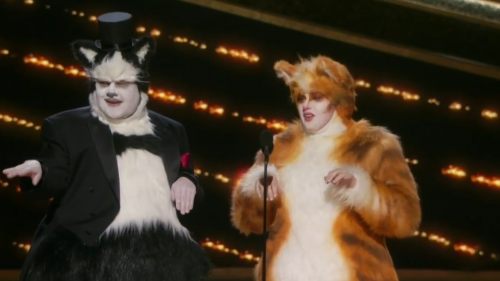CHICAGO: Oscar’s Flim-Flam Flummox
“Give em an act with lots of flash in it, and the reaction will be passionate.”“In a couple weeks nobody’s gonna give a shit about you.”
Those two quotes not only sum up the themes of Chicago; they sum up Chicago itself, and the Academy Awards whose Best Picture statue it won. Like all too many satires, Rob Marshall’s flashy musical ends up becoming exactly what it’s trying to poke sardonic fun at: murder as a form of entertainment.
In fact, Chicago is a veritable celebration of dishonesty and disingenuousness. It exists in an alternate reality where the only celebrities are female murderers and their lawyers - and where there can only be one female murderer celebrity at any given time, like some kind of jazz-killer Highlander.* It’s a safer, higher production value version of John Waters’ Female Trouble, but without the cutting directorial statements. There’s a halfhearted attempt at social satire - the one prisoner unable to afford the services of silver-tongued defence attorney Billy Flynn is also the only one to die - but ultimately, the film is too caught up in its own razzle-dazzle to say anything meaningful. No character in this film is not reprehensible in some way (except for maybe mild-mannered cellophane man Amos), but we’re expected to tap toes to their musical numbers and root for their awful causes.
And we kind of do!
Director Rob Marshall drew heavily on his theatre and choreography background for Chicago’s musical numbers, whose style seeped into the entire rest of the film. Translating stage musicals to screen isn’t easy, but Marshall employed a then-clever technique** to retain the musical’s stage roots while embracing cinematic language in a fundamental way. Cross-cutting between Fosse-inspired musical performances and (comparatively) real-world drama, Chicago uses musical numbers as internal monologue. They’re how protagonist Roxie views her glamorous world of crime. And whether it’s the human puppetry of “Both Reached For The Gun,” the stark silhouettes of “Cell Block Tango” or the literal courtroom circus of “Razzle Dazzle,” the musical numbers are consistently inventive and, yes, dazzling.
Chicago copped criticism for “MTV-style” editing that didn’t show the dance numbers properly, but to me, its hyperkinetic style represents the camera and (Oscar-winning) editor dancing with the film. There’s a fetishistic obsession with detail in the musical numbers, afforded to it by the lightning-fast editing that pops out tableau after tableau. The filmmaking matches the music; it’s as if Marshall is drunk on the musical potential of cinema. It’s just a shame his drunkenness slurred his delivery of theme.
As a Best Picture winner, Chicago’s statue was likely informed by forces external to the movie itself. Chicago bested the likes of The Pianist (which won Best Actor, Screenplay and Director) and Adaptation (which wasn’t nominated), and while amongst cinephiles those films are probably better respected, Chicago’s cheery energy clearly caught on in 2003. In context, it’s not all that surprising that it did.
At the time of the Oscars that year, the United States was preparing for an invasion of Iraq, with the first attacks taking place days before the ceremony. Shit was getting real in the response to 9/11, with protests taking place daily and the world fearing the consequences of what would turn out to be a far too long, far too drawn-out war. It’s entirely possible that Oscar voters simply wanted some light relief from the doom that threatened to consume the world. A fluffy, old-school Hollywood musical that says nothing might not have been what America or the Academy needed in 2003, but it’s clearly what it wanted.
* Consequently, Chicago is also a rare female-led Best Picture winner, passing the Bechdel test and generally being about female characters. Of course, it achieves its female-led status by being set in a women’s prison, and all those characters are kind of despicable, but we take the wins where we can get them, I suppose.
** Marshall would revisit the technique some years later in Nine, but the bamboozle was all yoozled up.



